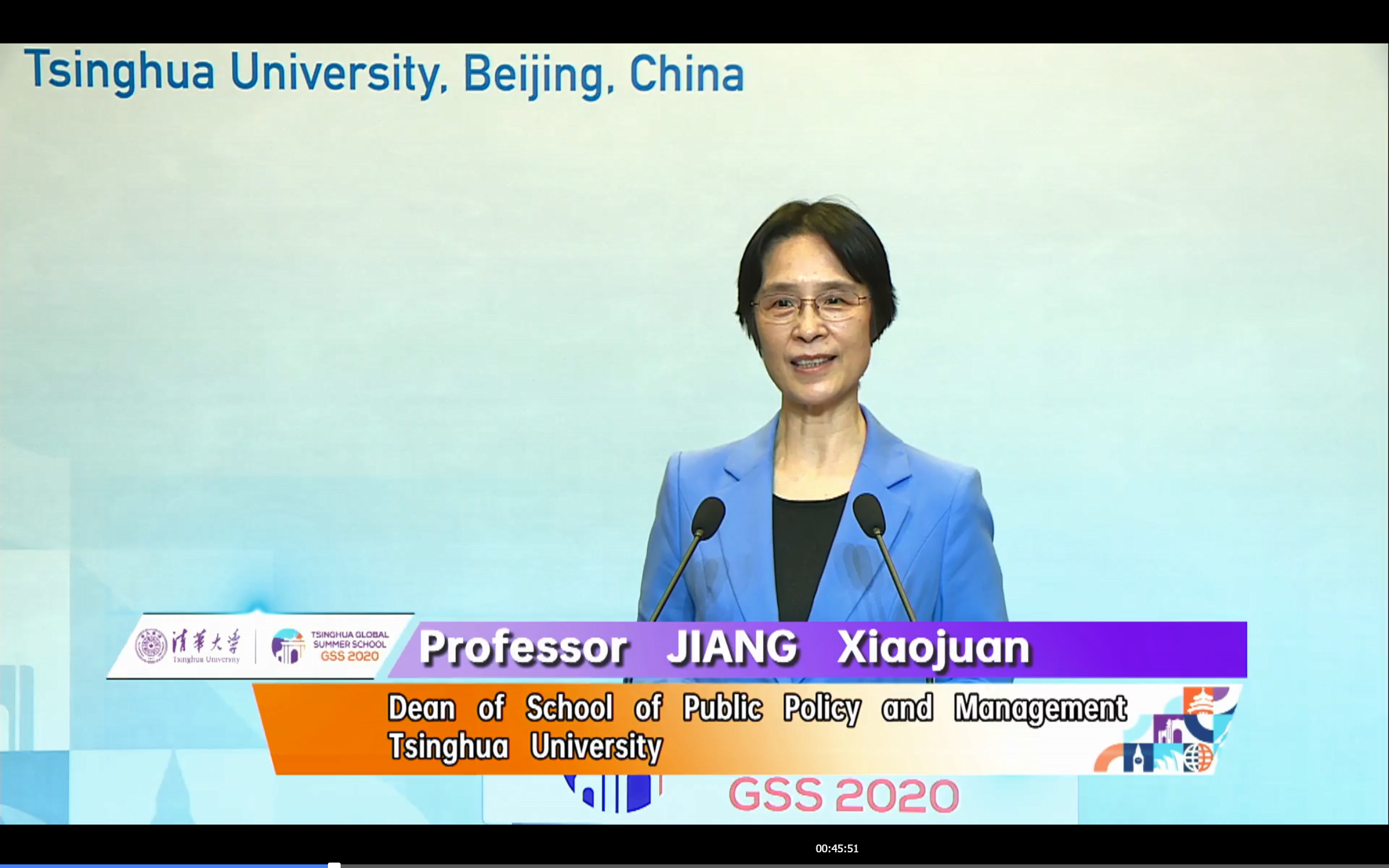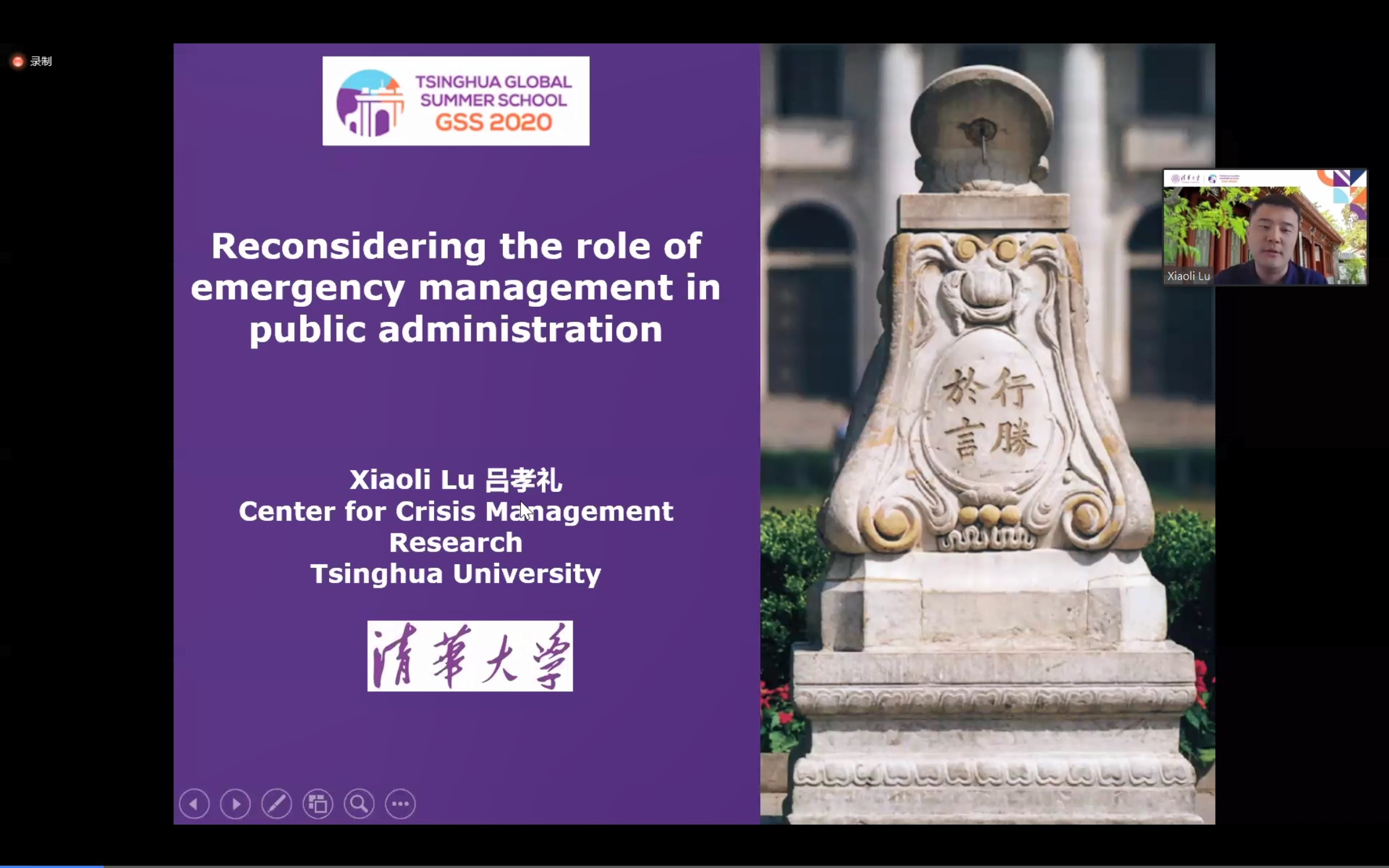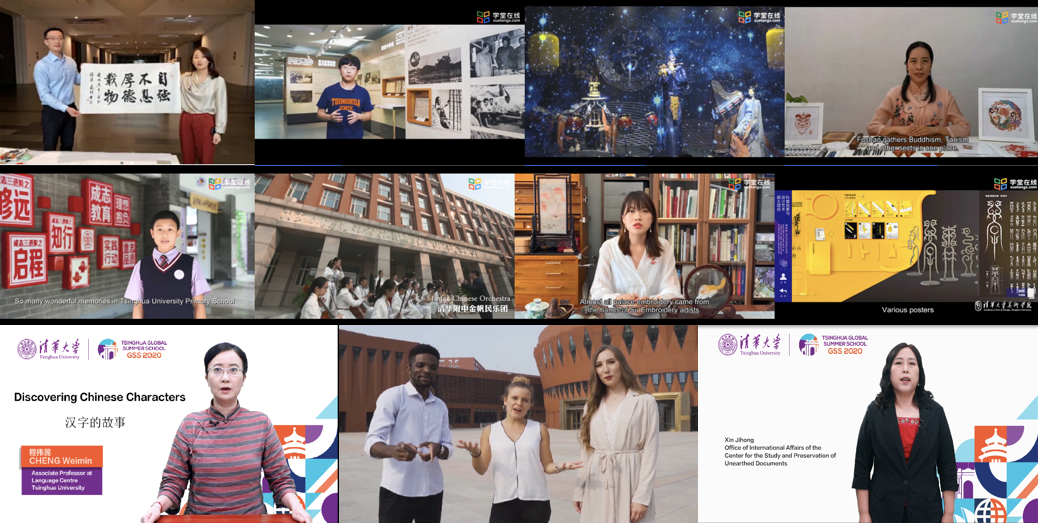On July 28, day 9 of the Tsinghua University Global Summer School (GSS) program, themed New Trend of Globalization and Global Governance Cooperation, was held by the School of Public Policy and Management (Tsinghua SPPM). Through a keynote speech, academic lectures, and online discussions, professors from Tsinghua SPPM shared their thoughts and perspectives with the students about globalization and governance in the digital age, reconsidering the role of emergency management in public administration, and China’s fight against COVID-19 from a comparative perspective.
Professor Jiang Xiaojuan, Dean of Tsinghua SPPM, member of the Standing Committee of the National People's Congress and Vice Chairperson of the Committee of Social Construction of the National People’s Congress, delivered a keynote speech titled Globalization and Its Governance in the Digital Age. Through examples, Professor Jiang first illustrated the three aspects of economic globalization— products, enterprises, economies, and pointed out that globalization will not reverse, but will adjust. The trajectory of globalization will play out through a combination of factors. Our modern digital globalization is dynamically evolving, and it plays a critical role in providing consumers with global choices, communication, and support when dealing with transnational emergencies. At the end of her speech, talking of the issue of how to deal with globalization in the digital age, Professor Jiang emphasized tolerance, respect, people-oriented, sustainability, and harmony as key factors.

Professor Jiang's speech was inspiring for many students, leading to a lively Q&A session to follow. In answering the question — does the impact of the pandemic on global supply chain and the financial market indicate the end or beginning of globalization? – Professor Jiang said that instead of using the “end” and “beginning” to describe the pandemic’s impact on globalization, “adjustment” is a better word choice. It is nearly impossible to explain the full picture of the scenario in a few words. One should analyze the situation from different aspects. Taking personal protective equipment as an example, mutual assistance among countries during different epidemic prevention periods is the result of the positive influence of global supply chains. On the contrary, industries that rely heavily on imported parts faced work stoppages due to traffic disruptions, being negatively impacted by the global supply chain. Professor Jiang believes that in the post-pandemic world, countries will begin to build backup supplies to adjust their global supply chain. Cost will no longer be the golden standard and products will no longer be dependent on sole areas, but will develop towards establishing a full internal supply system.
Emergency management has become an indispensable component of public administration in most countries. The responses to the ongoing COVID-19 pandemic demonstrated classical and emerging challenges to the emergency management paradigm. Associate Professor Lv Xiaoli gave a lecture on the topic of Reconsidering the Role of Emergency Management in Public Administration. Professor Lv is the Associate Director at Tsinghua's Center for Crisis Management Research and Executive Director of the Behavior and Data Science Lab. In his lecture, he focused upon the challenges in emergency management faced by China and other countries, and invited students to reconsider the role of emergency management in public administration in their own countries. Students actively participated in the discussion and shared their countries’ methods in dealing with the pandemic.

Following, Associate Professor Mei Ciqi from Tsinghua SPPM gave another lecture titled China’s Fight Against COVID-19 from a Comparative Perspective. He shared his thoughts upon China’s effective response against COVID-19 from the perspective of public management. During the Q&A session, he explained different policies carried out by the Chinese government to combat the pandemic and, combining theory with practice, he guided students to consider the implication of China’s experience against COVID-19 in the establishment of epidemic prevention and control policies for the global community.

At 6pm, Beijing time, a virtual tour of Tsinghua University Art Museum was held for GSS participating students. Led by Ms. Wang Ying from the Tsinghua Art Museum, students were able to feel present at the museum despite the distance, where they viewed the centenary art exhibition of famous painter WU Guanzhong as well as the four permanent collection exhibitions of weaving and embroidery, calligraphy and painting, furniture, and porcelain. During the event, Vice President of the art museum LI Zhe introduced and demonstrated calligraphy art, showcasing the beauty of this traditional Chinese art form.

Sun Shuo, tour team leader of the Tsinghua University History Museum, and doctoral student from the Department of Energy and Power Engineering, led participants on a virtual tour to the Tsinghua University History Museum, introducing Tsinghua’s founding history and the significant events in international communication and cooperation since the initiation of the university’s global strategy in 2016. Also, three Tsinghua international students: Hao Lulu, a doctoral student from Hungary studying at the Tsinghua School of Humanities; Nantang, a Master's student from Congo (Kinshasa) studying at the School of Economics and Management; and Francis, an undergraduate from Italy studying at the School of Environment, together took GSS participants to see more of the Tsinghua campus on a virtual tour. Visiting the campus’ first buildings, the teaching and research area and the student living area, they showed the beauty of the Tsinghua campus, which is the only campus in Asia to be listed in the Forbes "World's Most Beautiful College Campuses" ranking.
Also part of the final day activities was a special audio-visual feast by the Moja Chinese flute robot band, developed at the Tsinghua University Future Laboratory, by a team led by Associate Professor Mi Haipeng.
Chen Anying, Associate Professor and Head of the Department of Art History at the Academy of Arts and Design, also introduced to participants Suzhou embroidery and Foshan paper cutting, and invited two inheritors of intangible culture to demonstrate their expertise.Associate Professor Shi Danqing of the Academy of Arts and Design told us the story of how teachers and students of the Academy overcame difficulties during the epidemic and moved the graduate design exhibition from offline to online.
Professor Xin Jihong of the Unearthed Research and Protection Center introduced the history and related research work of the important cultural relic "Tsinghua bamboo slips"; Associate Professor Cheng Weimin of the Language Teaching Center introduced the origin, characteristics, and writing and pronunciation of Chinese characters; the Tsinghua University Middle School and Primary School also show their students' demeanor through video. On this last day of the summer school, a series of cultural experiential activities showcased the Chinese humanities and arts to students all over the world.
The Tsinghua University online Global Summer School (GSS) 2020, entitled Toward a Post-Pandemic World is a 9- day journey carried out collaboratively by 17 global academic institutions, including 11 different colleges and departments of Tsinghua, 4 overseas institutions, and 2 international association for higher education initiated by Tsinghua.
Bringing together Tsinghua’s finest educational resources and well-known Chinese and overseas professors through “in cloud” online lectures, webinars, interactive tours, and performances, GSS establishes an unprecedented interdisciplinary platform for students from different backgrounds to come together to engage with the opportunities and challenges of our post-pandemic world and to explore solutions for a more sustainable future. From this year on, Tsinghua University will continue to hold the Global Summer School program annually, devoted to making greater contributions towards our global community and shared future.
Reporter: Vincent Liu
Photos: Qiu Yinghan, Li Ruyi
Editors: Guo Lili, John Olbrich